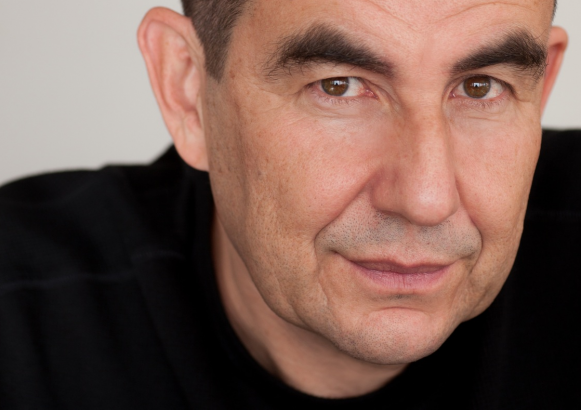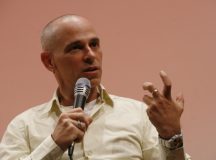Ari Shavit’s My Promised Land: The Triumph and the Tragedy of Israel is one of the most talked about books to be published about the country in recent years. According to Thomas Friedman, Shavit’s ‘painful love story’ offers, ‘the real Israel, not the fantasy, do-no-wrong Israel peddled by its most besotted supporters or the do-no-right colonial monster portrayed by its most savage critics.’ Fathom editor Alan Johnson spoke to Ari Shavit, a senior correspondent at Haaretz and a member of its editorial board, in London in February 2014.
On Zionism and Lydda
Alan Johnson: The book has been praised for rejecting the easy simplicities of ‘left’ and ‘right.’ You talk about Zionism being historically miraculous, but also historically culpable. If we turn to the culpable: you’ve devoted a whole chapter to events in the Arab town of Lydda in 1948 [from which Arabs fled during fighting]. You write, ‘Lydda is our black box … in it lies the dark secret of Zionism … if Zionism was to be, Lydda could not be.’ Why is Lydda the ‘black box’– the ‘dark secret’ of Zionism?
Ari Shavit: First of all, let me express my concern about taking the Lydda chapter out of context. The Lydda chapter is one of 18 chapters: I think it’s very important to see it within that context. My book is a painful love story which expresses my love and admiration to my nation, my total commitment to Israel, and my admiration for the Zionist project. My claim is that Israel is a man-made miracle. It’s not only just and needed, but a remarkable human endeavour. I think that if people look at Israel as it is, they should see an astonishing triumph of the human spirit. Israel is the very much needed home for a homeless people, in many ways created against all odds; it expressed and expresses the will, wisdom and determination of a people that faced extinction – a people still in danger – to save itself, not to surrender to death, but to choose and celebrate life. This is what the book is about. Lydda cannot be discussed without that context: I really take issue with people who pick out Lydda and ignore the rest of the book.
AJ: As some reviewers have done…
AS: …exactly. It’s very important for me. I claim that there was no other way, because according to the UN Resolution in 1947, rejected by the Arab League and by the Palestinian movement, the Jewish State would have had 55 per cent of the land with a huge (45 per cent) Arab minority. I do not believe this would have been a viable state, nor do I think the Zionists or the Arabs thought it would.
So, not only Lydda specifically, but this kind of brutal civil war within which Lydda happened was almost an historic necessity: it was part of the ‘tragic flaw’. I celebrate and believe in Zionism, but I look at the tragic part of it, and the tragedy was waiting to happen. Specifically, I do not believe that the Partition Plan could have worked with the tiny Israel having such a huge Arab minority. That’s why what happened in Lydda was not some sort of accident. Some of the specific brutal actions which led to the killing of many civilians were perhaps accidental, but were the result of a certain chain of events. Otherwise, Israel would not have been able to emerge as a strong, solid state. It would have had Lydda and many other Arab towns and villages at its very heart, not very far from Tel Aviv, on the road to Jerusalem and near the only international airport at the time.
Some Israelis have difficulty in acknowledging the tragedy; they try to believe this was just accidental. I beg to differ. If you look at the record, there is overwhelming evidence to prove my point.
Yet, I find it very important to put Lydda back in context because some people try to take it out. There are layers of context here that are really essential. One is the fact that wherever the Arabs won in the 1948 War, not one Jew remained. In many places there were atrocities. So the reason there is a Lydda chapter and not a Ness Ziona chapter, or a Rishon LeZion chapter, or a Rehovot chapter is that we happened to win. But had we not won, there is no doubt that many, if not most of us, would have been slaughtered. This was a brutal civil war, and what happened in Lydda and elsewhere was what happens in brutal civil wars.
The other point is that the 1940s were very, very brutal. Hiroshima was a thousand times worse than Lydda, and no one argues that because of Hiroshima the US is not legitimate. Dresden was a hundred times worse than Lydda, but no one claims the UK is not legitimate. I totally reject the attempt of some anti-Israelis or anti-Zionists to use this tragedy in order to undermine Israel’s legitimacy. This is the dark side of history, this is the black box, a terribly tragic event – but it should not be abused and taken out of context. While it is my duty as a Jewish Israeli to address this with empathy and precision, it is the duty of Palestinians not to be addicted to that painful past, or poisoned by the tragedy, but to try to move on in the way that Jewish Israelis moved on; not becoming addicted to their tragic past but trying to build a life for themselves, for their children and their grandchildren. I wish the Palestinians could do the same. I wish that while we acknowledge their tragedy, past and pain, they will move forward and create a future, both for them and for us.
On Israel and the Diaspora
AJ: You are passionately committed to a liberal, democratic, egalitarian Israel. Not least because only that Israel can attract, yes?
AS: What really concerns me is the young Jews of the Diaspora. In North America, Europe and elsewhere, I see that the vast majority of them – definitely the ones who are not Orthodox or ultra-Orthodox – are progressive. Their values are social justice, universal, peace-seeking values. My greatest concern is that so many of them perceive Israel as a tribal entity and find difficulty with its ‘tribalism.’ I’m proud of our tribe – I’m not ashamed and I think that our tribe is unique in that it is universal; it has universal values and a universal mission – Tikkun Olam. But I think it’s our duty to reach out to the young Diaspora Jews and convince them that Israel is relevant and attractive to them. An Israel perceived as a semi-theocracy cannot be attractive.
If we are to save them for Judaism, for Jewish life: we have to change. We have to move beyond occupation and we have to prove that even within Israel itself we are a real liberal democracy which respects the rights of individuals and minorities. I think that basically we are: Israel is a remarkably free democracy, our spirit is free, and our society is free. But our democratic institutions are somewhat dysfunctional. The values of Israel are democratic, but there are darker forces within Israel and sometimes we surrender to them. I think we should not. We should point out to those people in Israel, on the far right or in ultra-religious parties, that they are, ironically, risking the Jewish future. The Jewish future depends on us saving the young Jews of the Diaspora. This is in my mind a most important mission and I hope, I plead, that my government, prime minister and the Israeli body politic will internalise the fact that not only is settlement activity wrong, that it endangers our relationship with our neighbours and our legitimacy worldwide, but that it endangers our ability to win hearts and minds in the Jewish world. We have to act quickly, dramatically, to reposition Israel both for the outside world, to strengthen our legitimacy, and for the Jewish world. One of my greatest fears is that if things go on the way they are now, we will endanger the much needed alliance between the Jewish Diaspora and the Jewish state.
On Occupation and Intimidation
AJ: How optimistic or pessimistic are you about Israel’s future?
AS: In the book I followed two different courses. On the one hand, I emphasise how challenged Israel is. In order to get the Israeli condition today you have to realise there are two pillars: occupation and intimidation. My argument is that while people on the left – in Israel, the UK, Europe and North America – tend to focus on the occupation and overlook intimidation, the right emphasises intimidation, overlooking occupation. You have to deal with both. One of the reasons we have failed in dealing in with the occupation (and I’m anti-occupation) is that we have not addressed intimidation seriously enough. Had we convinced the Israeli majority that we were serious about understanding their legitimate concerns of security, we would have been in a much better position right now regarding occupation.
In the book I make it clear how endangered Israel is – one of the most endangered nations on the face of the Earth. No other OECD nation faces what we face. If you read through the book and get the story of Israel and the conflict, you see that there is an inherent tension between the Jewish democratic state and many of its neighbours. This is because of many layers – religious, national, the intolerance towards minorities in the Middle East, especially non Arab minorities. There is a difficulty in accepting us as a real people with legitimate rights. That creates intimidation. Israel is fundamentally challenged and in danger. The overload of challenges and stress is astounding. That’s the pessimistic part.
The optimistic part is that having made this journey, becoming an amateur historian, going through our history, you are amazed: despite a hundred years of the walls closing in on us, something happened almost every decade to open the space for us. The most striking example is the late ‘80s or early ‘90s, when people were very pessimistic about our future – demographically, economically, and politically.
Within a few years amazing things happened: we got out of Lebanon, the economy picked up, the Russian immigration energised the country in astounding ways and was a remarkable success, contributing to our economy and to our culture (imagine Britain having to absorb 12 million immigrants within two years, Britain would have been in shock!). At the same time, hi-tech appeared – and for all my criticism of the Israeli government, it was government decisions that enabled this to happen.
So my answer to the question is that it’s very much up to us. We should go back to the old wisdom of the early Zionists, to see how challenged we are, not to panic, despair or become too self-righteous or sentimental, but to deal with the cruel reality, the existential challenges we are facing in a creative, imaginative manner. I think that the energy within Israel is astounding – Israel is a powerhouse of vitality in every way possible. The problem is that our politics are so dysfunctional, and our leadership in many ways so unworthy (not to talk about any specific politician). There has been political failure in Israel for 30, 40 years in dealing with the fundamental issues in an overall way. If we can get the leadership and the political system right, and bring the great energy you see in Israeli society, economy, culture and arts back to politics, then I’m hopeful that we can deal with the challenges.





































Comments are closed.